Boston Judge Frees Man While He Fights to Overturn 1998 Murder Conviction—With Prosecutors’ Help
Rickey “FuQuan” McGee spent 28 years in prison for a murder he says he didn’t commit. Now, prosecutors agree his convictions should be overturned.
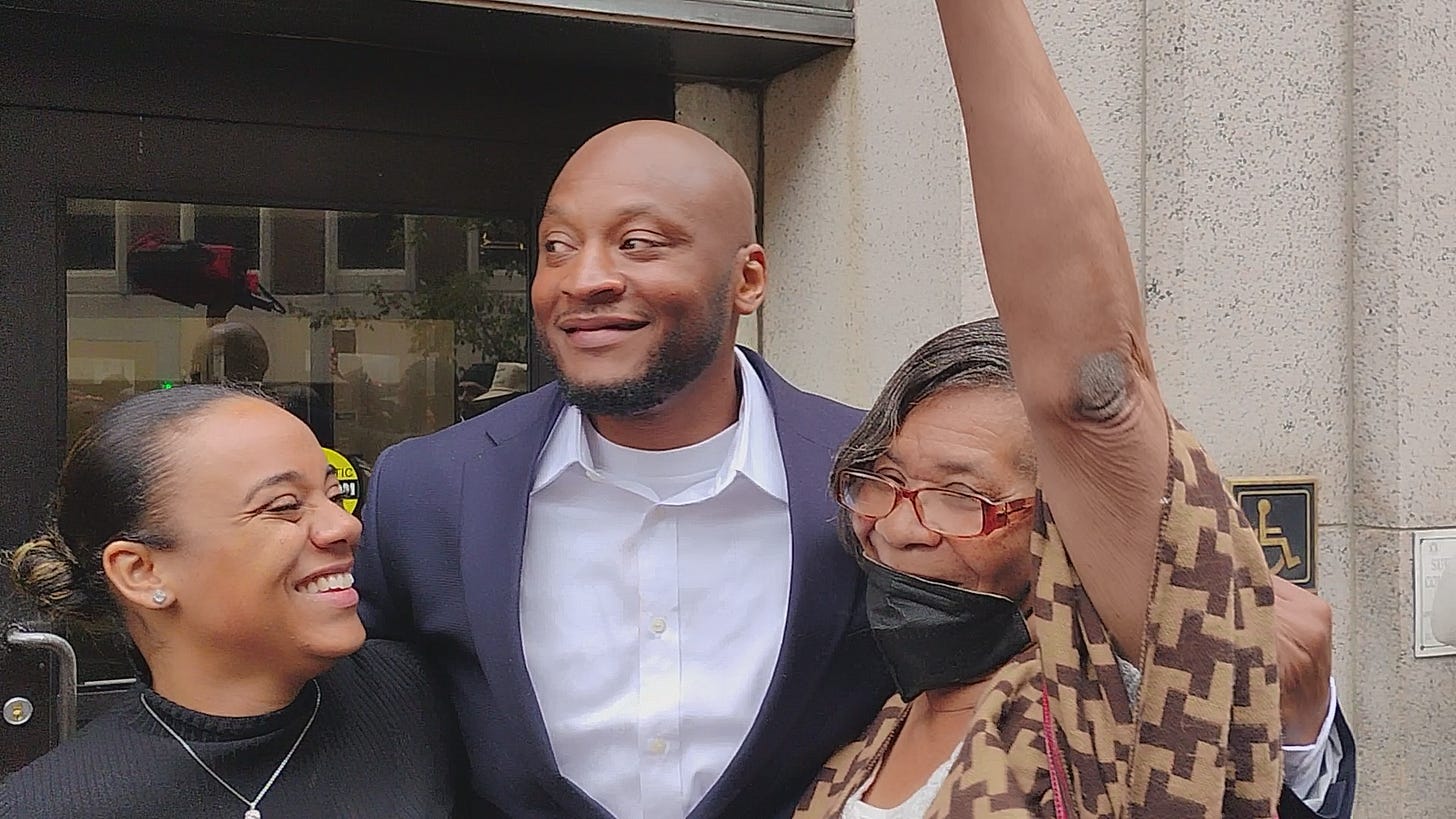
After spending 28 years in prison for a murder he says he did not commit, Rickey McGee—known to his friends as “FuQuan”—stepped out of the Suffolk County Superior Court in Boston surrounded by dozens of jubilant supporters on October 14. The overcast sky drizzled on his skin as he celebrated the new beginning.
“I’m going to live incredibly,” McGee told the crowd as he held his fiancée and mother. “Just with the support and the love, I’m not alone. I’m coming out to a community. I’m coming out to a nation.”
In 1998, the Suffolk County District Attorney’s Office prosecuted McGee for murdering a Boston convenience-store clerk during a robbery. But now, nearly three decades later, prosecutors agree with McGee’s lawyers that the case should be overturned due to previously undisclosed evidence that raises concerns about the integrity of a key witness. At a hearing on October 14, Suffolk County Superior Court Judge Michael Ricciuti paused McGee’s sentence and released him from prison. However, the judge will not decide whether to throw out the convictions until after another hearing on October 27.
In an interview, McGee said he was feeling “incredibly optimistic” about returning to court later in the month.
McGee was sentenced to life in prison after a jury convicted him of first-degree murder, armed robbery, and carrying a firearm without a license. Prosecutors accused him of committing the 1997 murder of Getasetegn “Geta” Yalew, a 34-year-old clerk at Christy’s Market on Jersey Street.
Yalew was shot in the back of the head while lying behind the store’s counter some time between 2:16 and 2:40 AM on April 16, 1997, according to court records. The assailant stole food stamps, coins, and less than $100 in bills.
Investigators did not locate any physical evidence tying anyone to the crime or any eyewitnesses, and the store’s surveillance camera was not recording at the time. However, prosecutors alleged that McGee, who was 19 at the time of the murder and lived just a few blocks away from the store, confessed to two people. Questions about the credibility of those witnesses were central to McGee’s defense at his 1998 trial, but they did not stop the jury from finding him guilty.
However, in a motion filed in March 2024, McGee’s lawyers said that newly disclosed evidence the prosecution failed to turn over before the trial casts further doubt on the testimony of one of the witnesses. And in October, after conducting a new investigation, the district attorney’s office filed a motion that—while not explicitly describing McGee as innocent—says that there was “a substantial risk of a miscarriage of justice” in the case.
The evidence, according to the district attorney’s office, shows that the witness admitted to threatening McGee’s family and collecting a $25,000 reward for her testimony. It also shows that Boston police officers protected her from prosecution for alleged bank fraud, even threatening to arrest the victim, the district attorney’s office said.
At the October 14 hearing, one of McGee’s attorneys, Jeff Harris, emphasized to the judge how unusual it was for the district attorney’s office to agree that a conviction should be overturned.
“I do think that it’s very significant,” Harris said. “This is not something that has happened very much.”
In court records, McGee’s lawyers also said that newly disclosed evidence shows investigators had reason to suspect another man of committing the murder. However, a spokesperson for Suffolk County District Attorney Kevin Hayden’s office declined to say whether prosecutors are pursuing another suspect, saying the office is “not commenting beyond the court filings at this point.”
The murder victim, Yalew, worked as a chemistry teacher in Ethiopia before immigrating to the US in 1996 on a visa, according to Boston Globe reporting. He worked at the convenience store to earn tuition for graduate school and to support his wife, who planned to eventually join him in the US.
After McGee was found guilty of the murder, he addressed the trial judge who would soon sentence him to life in prison, according to a transcript. McGee told the judge that he had known Yalew for about a year and a half.
“And when he died, I mourned for him too,” the then-20-year-old McGee said.
He added: “I know I’m not a killer. … I’m not the individual who done the crime even though it may be perceived different.”
In 2021, while incarcerated at MCI Norfolk, McGee founded the Harriet Tubman Project. Named after the 19th century abolitionist who helped free slaves as part of the Underground Railroad, the group educates incarcerated men about “the intersections of the criminal justice system and systemic racism, equipping themselves to effectively advocate for their rights within that system,” according to its website.
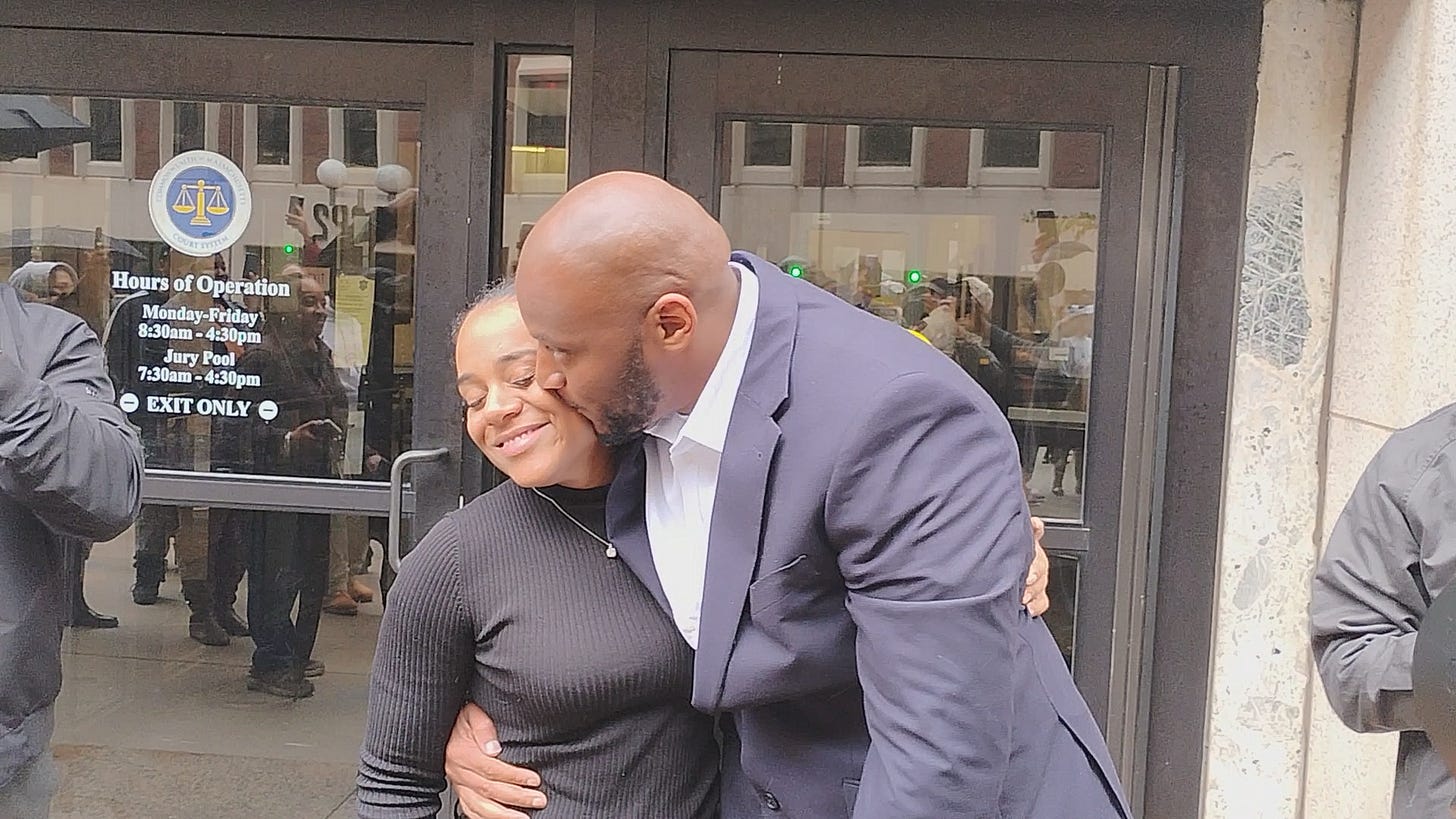
During McGee’s time in prison, he also got engaged to Jacqui Fonseca, who works as an intake coordinator at the New England Innocence Project. The couple said they were introduced by McGee’s cousin, who was a friend of Fonseca.
“When I met him, he had a life without parole sentence, and we committed to this partnership,” Fonseca said. “I didn’t have any doubt that he would be out because I know his work ethic. I studied his case.”
“Wait Till You See What I Do to Her Kid”
At McGee’s 1998 trial, he was implicated by a woman who lived with his family at the time of the murder. In July 1997, nearly three months after the killing, she told police that McGee claimed responsibility the morning it happened.
But recent interviews with witnesses, including the woman, provide reason to doubt her trial testimony, according to the motion filed by the district attorney’s office.
When contacted by an investigator for the district attorney’s office, the woman acknowledged threatening McGee’s family because she believed his mother caused her to lose custody of her children, the motion says.
The woman recalled that, after McGee was charged with the murder, she said to his sister, “Your mother had my kids taken away but wait till you see what I do to her kid,” according to the document. At trial, the woman denied making a similar threat to McGee’s mother.
The woman also confirmed that she accepted a $25,000 reward from the convenience-store chain for providing information about the murder despite testifying that she had no interest in the money, the document says.
Additionally, the district attorney’s office said there was evidence that Boston police officers shielded the woman from prosecution for bank fraud that she allegedly perpetrated in 1997.
The victim of the fraud told the district attorney’s office that police said the woman was responsible but couldn’t be touched because she was a witness in a murder case, the motion says. The fraud victim also said that an officer came to her house, told her she was interfering with an investigation, and said she could be arrested if she did not stop, the document says.
The victim’s story was corroborated by a former bank employee, according to the district attorney’s office. The employee said the bank possessed ATM photos proving the witness was responsible for the fraud and submitted a report to the police, the motion says.
The employee said a man who claimed to be a Boston Police homicide detective called him, said the woman was a witness in a homicide case, and said he needed to drop the matter, according to the motion. The detective also said he would provide the woman with an alibi by testifying that she was with him at the time of the fraud, the employee said, according to the document.
“[T]he newly discovered evidence, as it related to the interference with the fraud investigation, could have prompted the jury to question not only [the witness’s] reliability but also the reliability of the entire police investigation,” the motion says. “Evidence of such alleged misconduct could have been a real factor in the jury’s deliberations.”
“I Don’t Think It’s Fair”
On October 14, more than 40 supporters—including McGee’s fiancée, mother, and two nieces—packed into a Boston courtroom to learn whether he would be released from prison. There were so many attendees that court officers had to grab chairs for people who couldn’t fit on the benches.
McGee, dressed in a dark blue suit, smiled at the crowd as a court officer escorted him to the defense table. “Peace, God,” several supporters said before they were admonished by an officer.
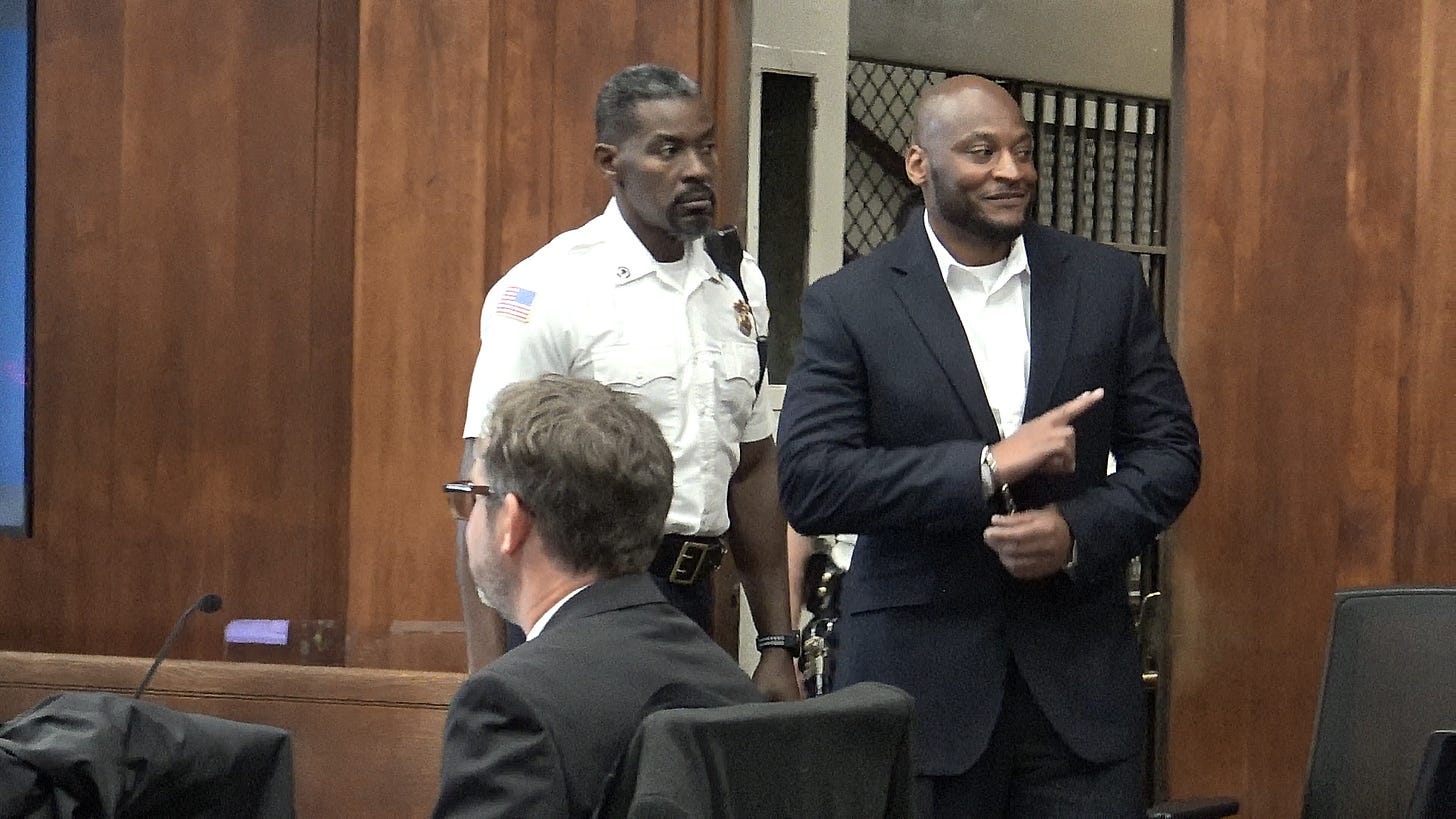
After entering the courtroom, Ricciuti asked the attorneys for McGee and the district attorney’s office about gaps in the new evidence. McGee sat stone-faced as he listened to the judge.
“That’s not a space to get emotional,” McGee later said. “I’m just in there trying to figure out … what he’s saying and how can we respond. The emotions will come later.”
Ricciuti asked whether the woman who implicated McGee lied when she testified that she didn’t threaten his mother.
Assistant District Attorney Zachary Host said the witness made an “omission,” adding, “She did say [the threat], to be very clear. She just didn’t say it to [McGee’s] mother.”
Ricciuti asked which police officers spoke with the fraud victim and bank employee, saying it was important to his legal analysis whether they were part of the prosecution team.
Host said the victim and bank employee didn’t know the names of the officers and the district attorney’s office had not been able to identify them.
“I don’t think there’s evidence that we’ve found to show that anyone on the prosecution team knew this was going on,” Host said.
Harris said the judge should “presume that anything that the [Boston Police] homicide unit did in this case to try to help the prosecutor should be considered part of the prosecution team” even if the prosecution didn’t know about it.
“Shielding [the witness] from prosecution was a clear due-process violation no matter who did it on the Boston Police,” Harris said.
Ricciuiti also wanted to know why the district attorney’s office didn’t ask the witness about the fraud investigation when interviewing her during the recent investigation.
“Just because no one thought of it?” the judge asked.
“That’s correct,” Host responded.
Harris said he thought it “was already so obvious that she had committed this fraud” that “it didn’t need to be asked.”
The judge asked the attorneys why the new evidence was sufficient to grant the “extraordinary relief” of overturning McGee’s convictions. They attorneys said that the only evidence of McGee’s guilt was the testimony from the two witnesses who claimed he confessed.
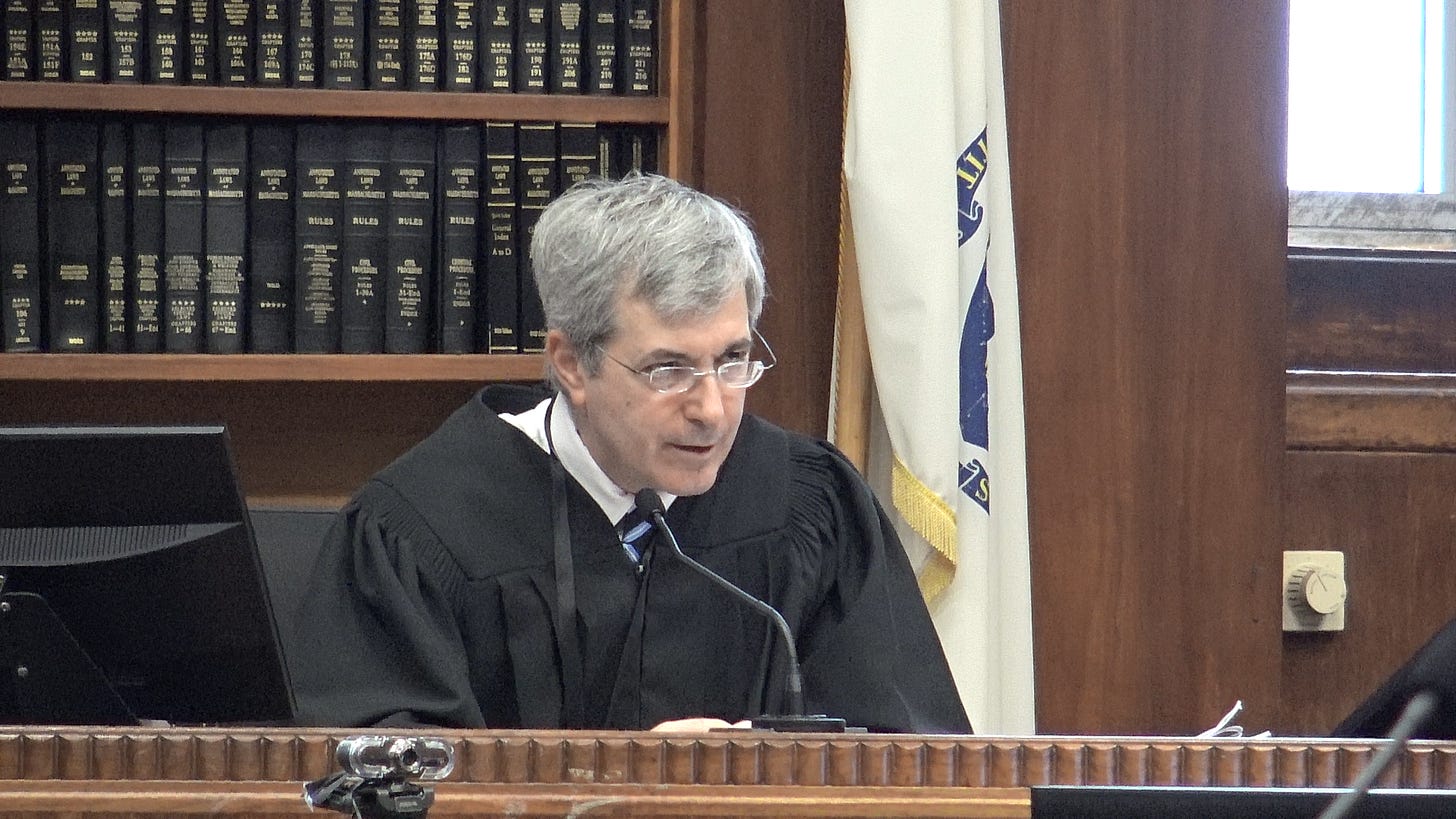
“Both witnesses … appear compromised in some capacity, and those capacities just didn’t play out in front of a jury,” Host said.
Harris said that the testimony about the alleged confessions is “the weakest kind of evidence in a first-degree murder case.”
After questioning the attorneys, Ricciuti walked them through his reasoning. The judge said he was “troubled” by the fact that the witness now admitted to threatening the McGee family, saying it was “a fundamental change in what the evidence would have been against a key government witness.”
He also said he found it “hard to believe that someone would gratuitously interfere with a fraud investigation from the homicide division without having some connection to the case.”
“It’s an impossibility to put [proving that] on the shoulders of the defense,” he said. “It’s 30 years later. … Even though the evidence is not pristine, … I don’t think it’s fair to keep this defendant in jail.”
The judge said he was releasing McGee without bail but required him to report to the probation office once a week, engage in mental health counseling, live with his mother, and abide by a curfew.
McGee maintained his collected demeanor as the judge read the bail conditions. But his fiancée, Fonseca, began sobbing. She covered her mouth as McGee’s mother, Marian Merriman, hugged her.
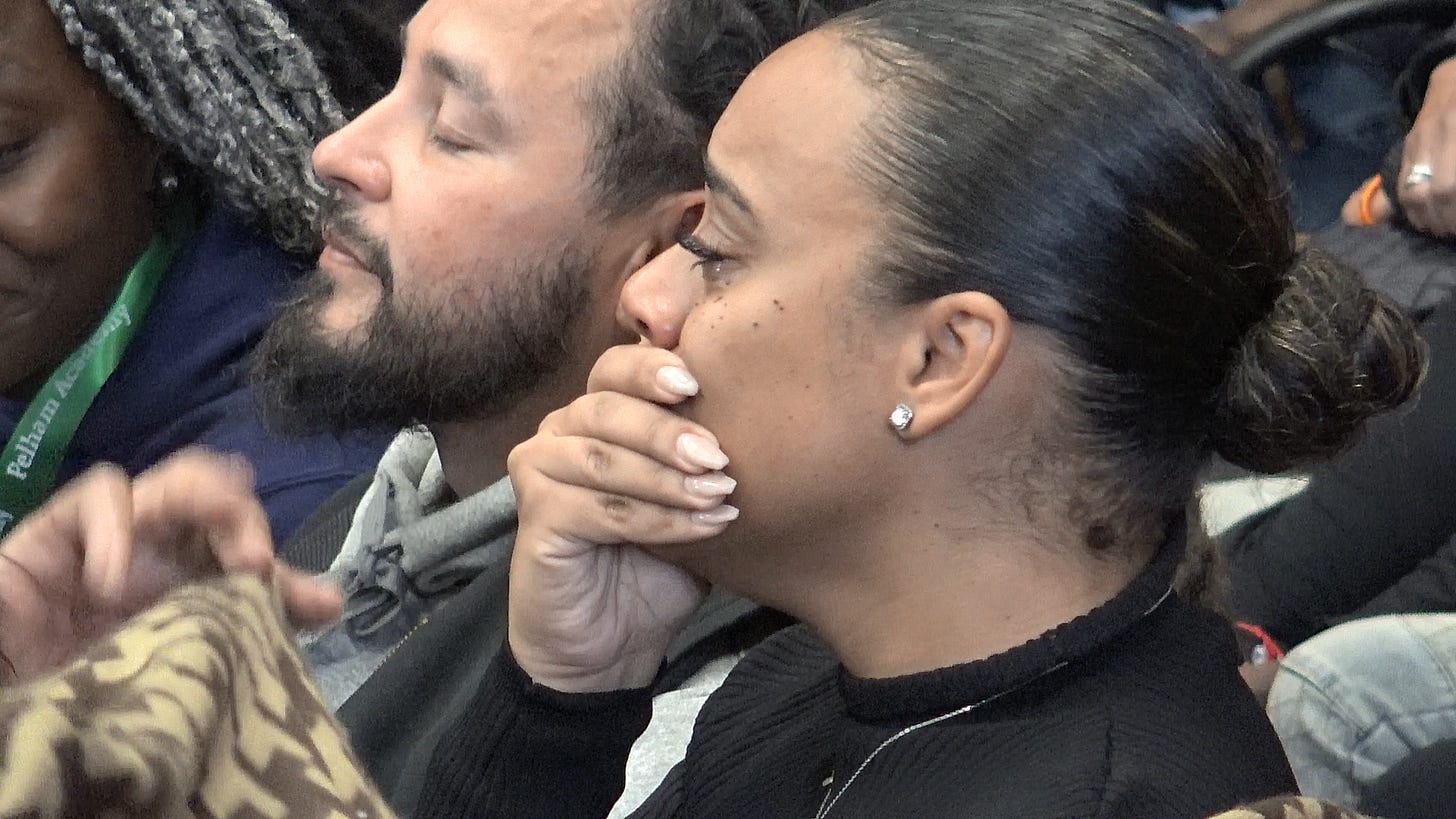
“I’m Out to Get More Out”
After the hearing, Fonseca and Merriman hugged other family members and supporters outside the courtroom while they waited for McGee.
“[I’m] excited, happy, relieved,” Fonseca said. “This is what we’ve been waiting for. And I know that he’s ecstatic. I can’t wait to see him walk out that door.”
The supporters soon migrated to the first floor and filled up the hallway outside the probation office, where McGee was filling out paperwork with his lawyers. When McGee emerged at 12:07 PM, he hugged his mother and the crowd erupted into cheers.
McGee hugged his attorney, Harris, next. Then he hugged and kissed his fiancée, raised his fist in the air, and smiled at the crowd. Then he hugged a close friend. Then his two nieces. And then he hugged even more of his supporters until a court officer asked the group to move outside.
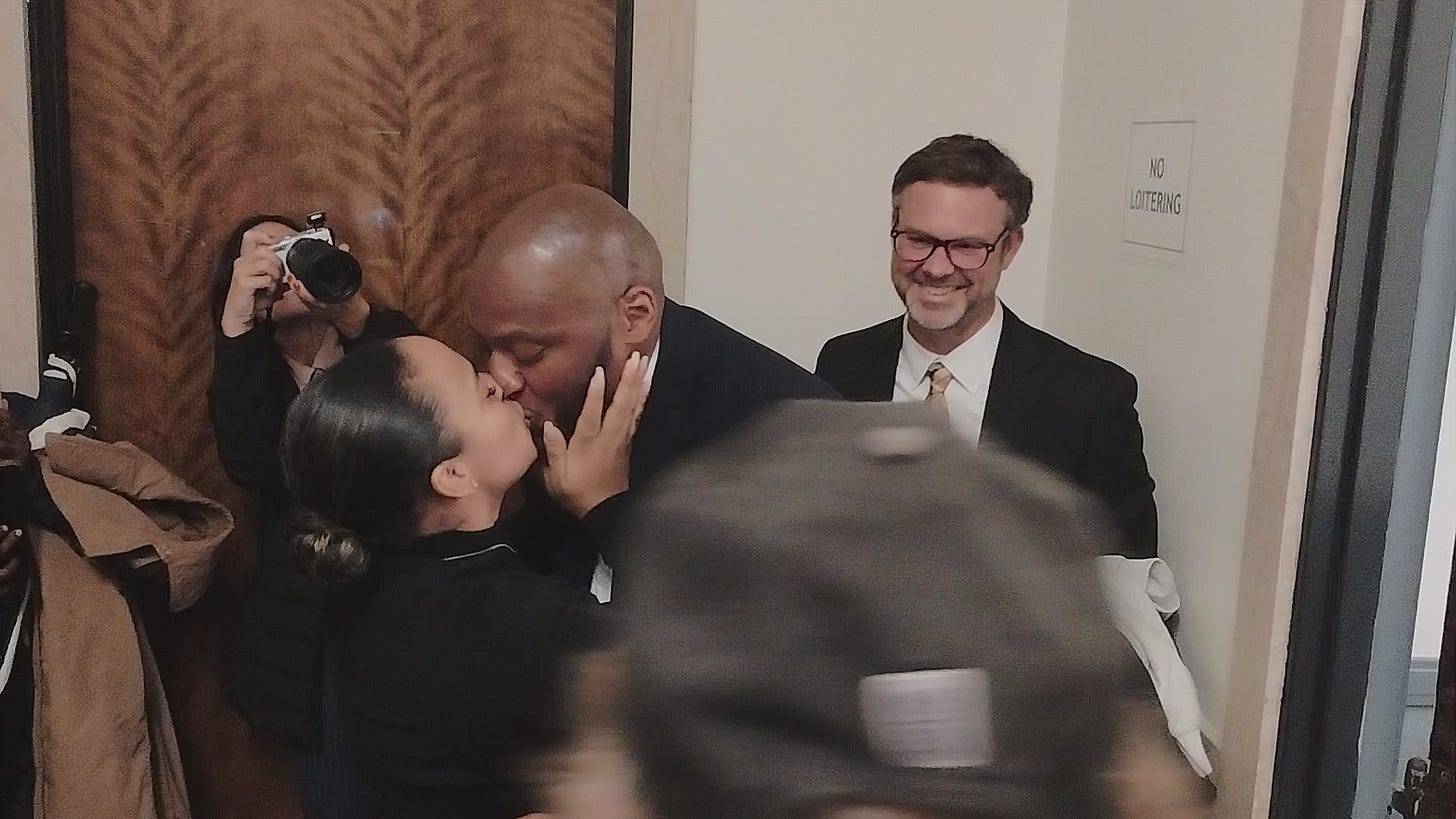
Several of the men McGee hugged—Stephen Pina, Albert Brown, Raymond Gaines, and Sean Ellis—spent decades in prison before their own murder convictions were overturned due to misconduct by Boston law enforcement. The five men, all of whom are Black, collectively spent more than 160 years in prison.
“I cry freedom,” Brown sang as McGee made his way toward the exit. “Freedom today. Freedom, freedom, freedom.”
Finally, at 12:12 PM, McGee stepped outside, mugged for the crowd, and then resumed hugging people.
“I feel free to free,” he said. “I feel free to feel. I got a freedom fetish. … It’s all about fortitude. It’s about grace, staying committed, staying a day ahead of hell, and just paying it forward, man.”
He told the group he felt “incredible.” “But,” he added, “the unfortunate part is, I shouldn’t feel incredible about capturing something that was stole from me.”
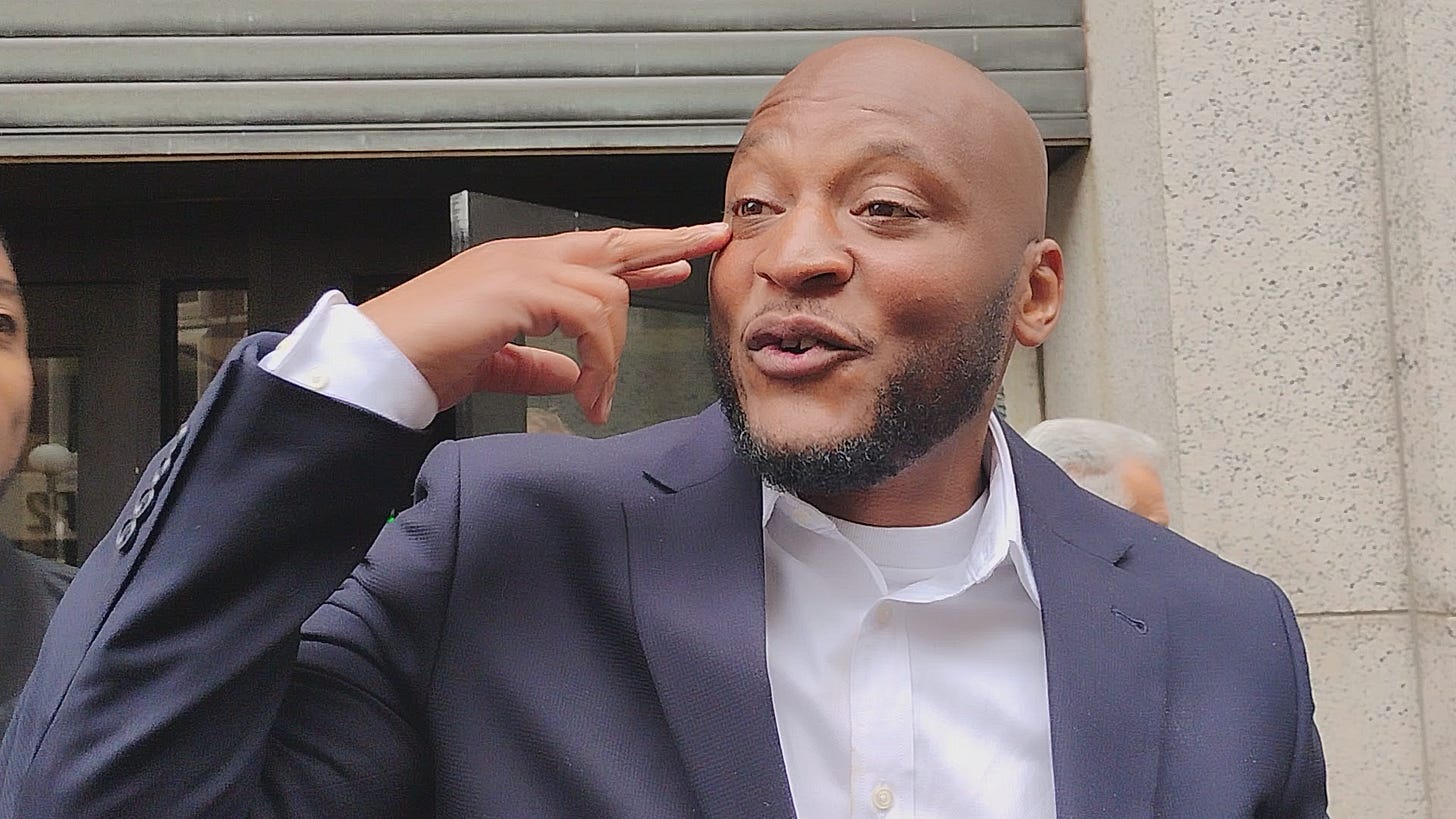
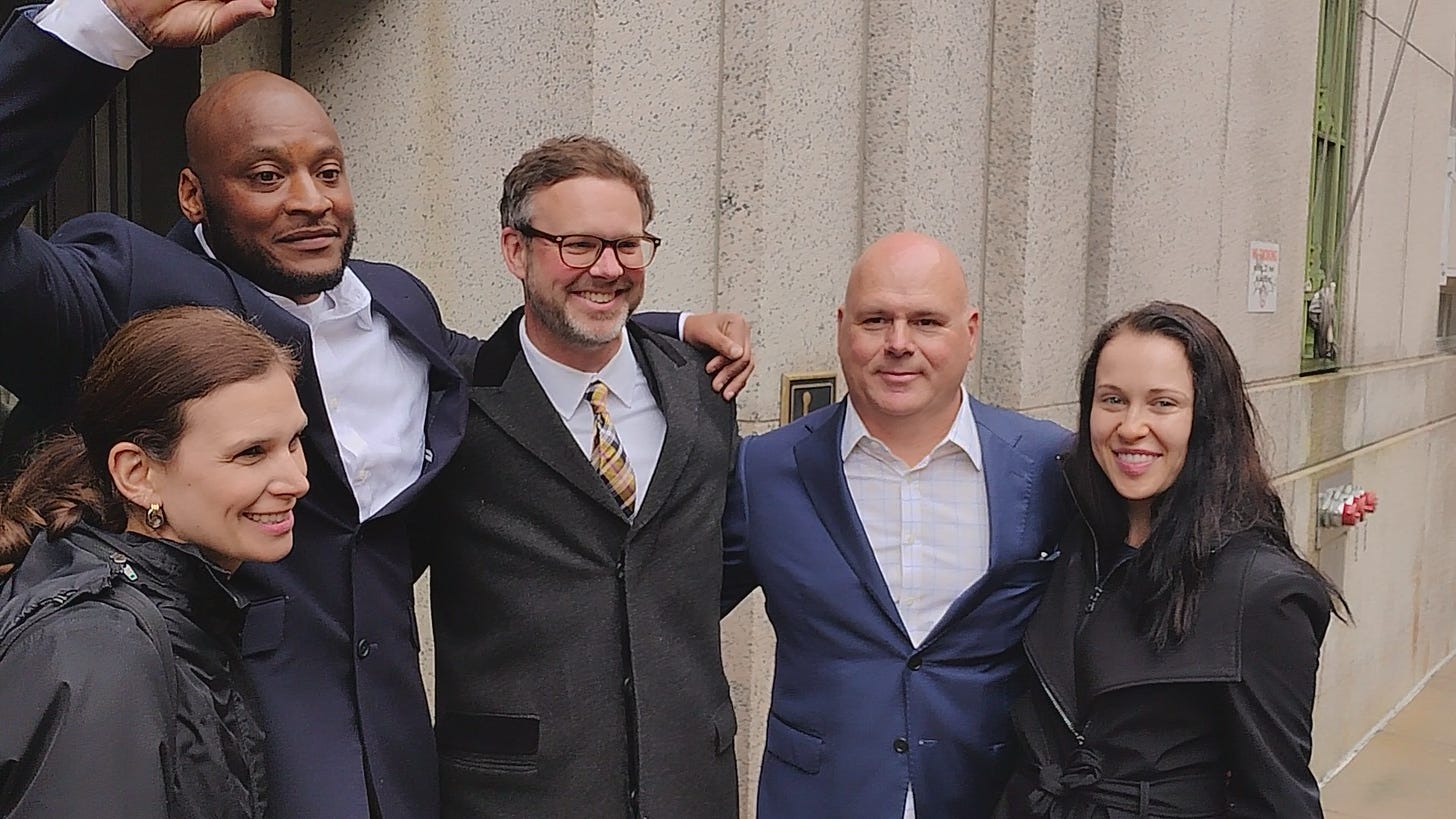
McGee’s mother, Merriman, said it felt like she’d just given birth to her son a second time and planned to take things “one day at a time” as she helped him transition to life outside prison, according to GBH.
“This is 28 years of fighting every day, every week, and we’re just relieved as a family to have him home,” said Emerson Ocampo, McGee’s close friend who considers him a brother.
But McGee sounded like he was ready to take on the world. He said that he plans to use his freedom to advocate for others who are still incarcerated.
“Just know that there’s countless brothers, man, that are going through tribulations in there, and they’ll never be forgotten,” he said. “I’m out, but I’m out to get more out.”
After McGee left the courthouse, he went to his mother’s house “with a few loved ones and a few friends and kind of processed things,” he said. Then they went to Ocampo’s house, and he ate his first meal as a free man: barbecue honey chicken wings and pizza.
“That was the first day,” he said. “Every day after that had its own adventure.”
He spent the rest of the week connecting with loved ones, going clothing shopping with his brother, buying groceries, requesting an ID and social security card, looking into job opportunities, and visiting a mosque.
When he spoke by phone on Sunday night, he and Fonseca had just left an arcade in Boston, where he tried out a VR headset and played some racing games like Super Bikes 3 and Cruis’n Blast.
“[I’m] just keeping a balance, not just dealing with everything heavy,” he said.
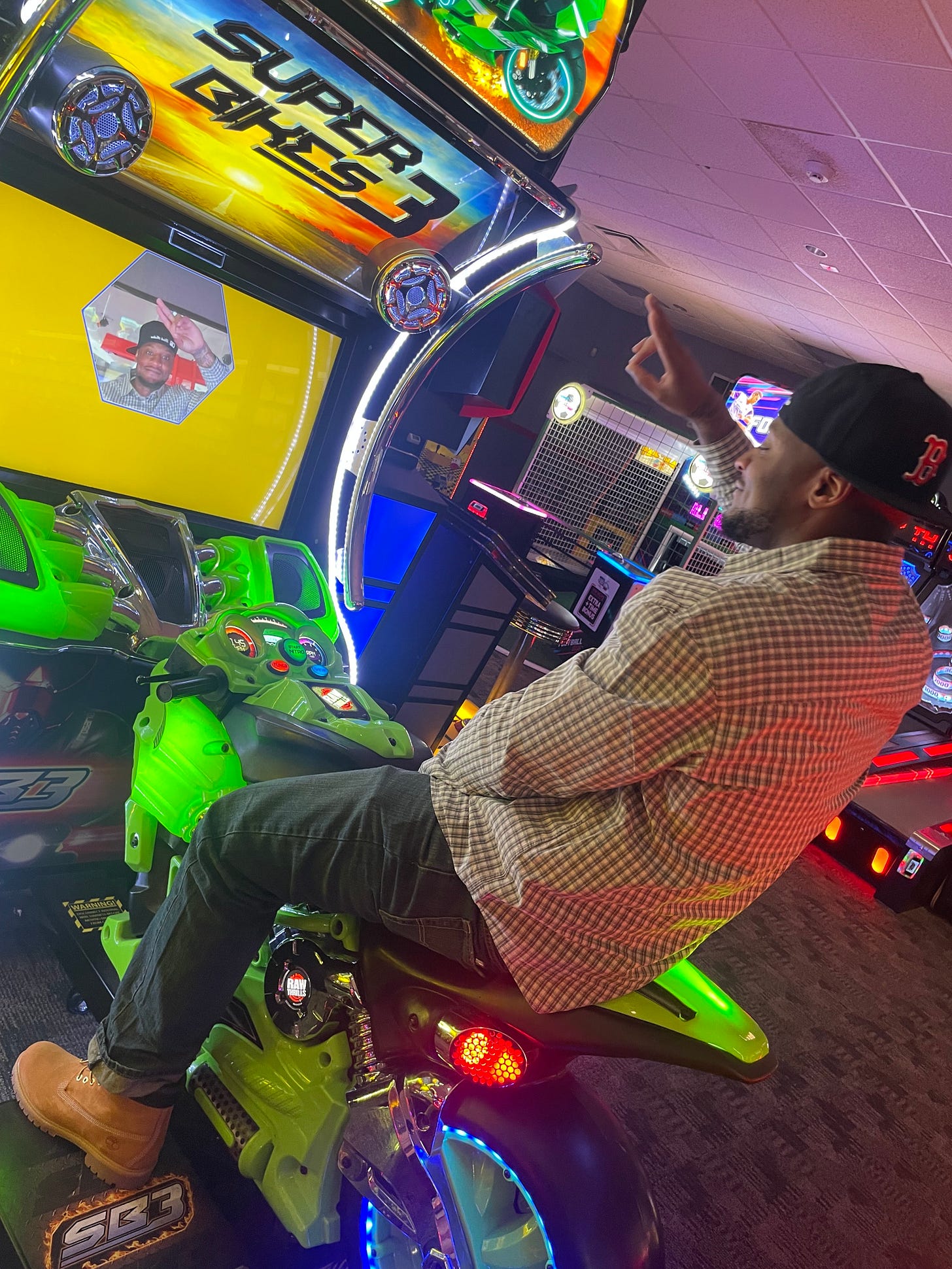
The experiences he cherishes the most were his visits with family over the weekend. That time, he said, was “profound.”
“My nieces are age 26,” he said. “I haven’t known them outside of visiting rooms. So just to be able to sit with them as a uncle, as a mentor, … someone whose wisdom they value, was incredible.”
McGee said he wanted people to know that although his time in prison was painful and dehumanizing, it taught him who he really was.
“The adversity that we encountered allowed me to identify a fortitude that I would have never imagined that I had,” he said. “I never would have knew I was that strong unless I endured such an ordeal.”
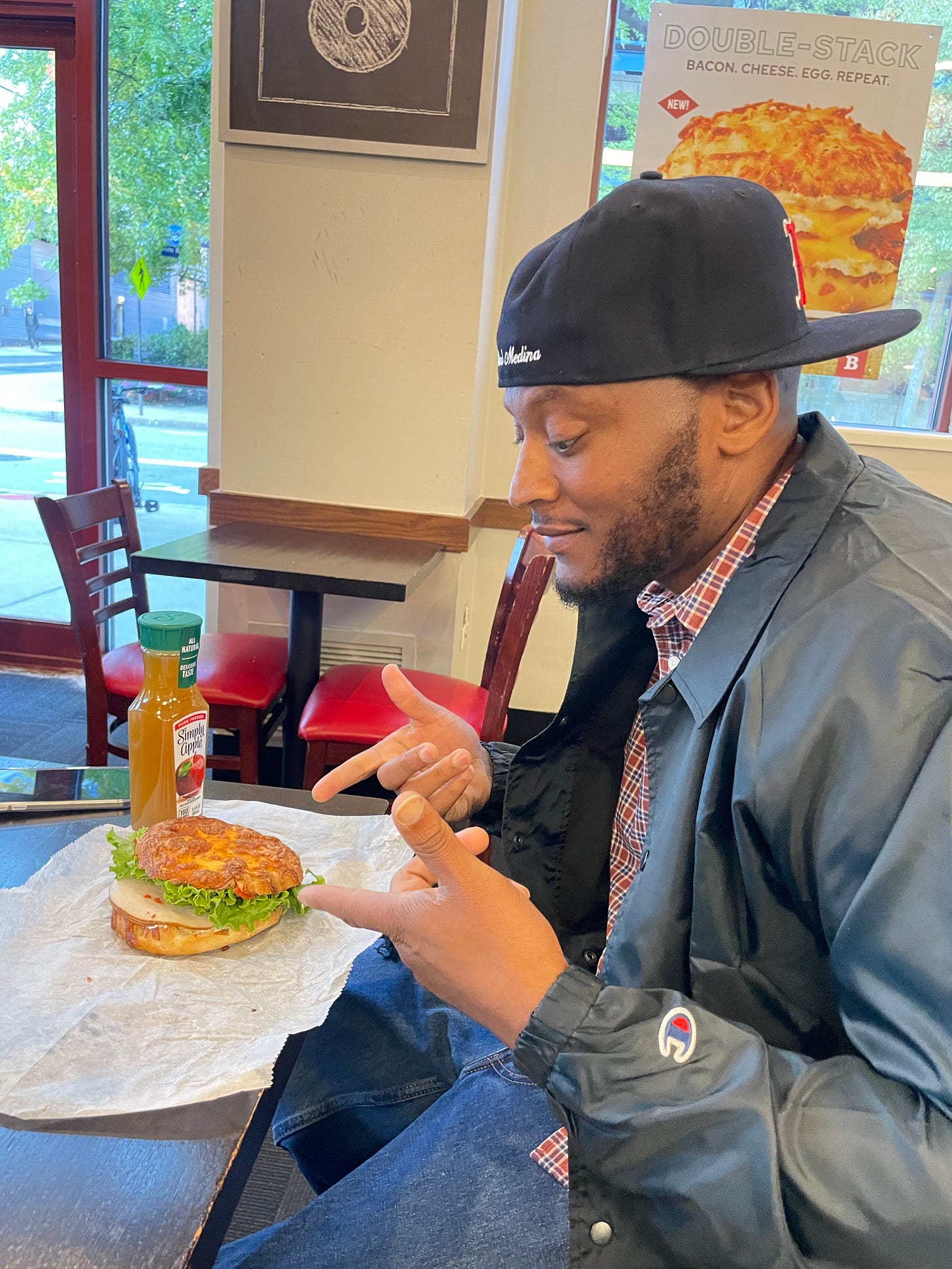
CORRECTION: This story initially identified the courthouse where McGee’s hearing was held as the John Adams Courthouse. That is the name of the building next door that houses the Appeals Court and Supreme Judicial Court.
Thanks for reading! Journalism like this takes a ton of time, energy, and care. If you’d like to keep The Mass Dump running, please consider offering your financial support, either by signing up for a paid subscription to this newsletter below, becoming a Patreon supporter, or sending a tip via PayPal or Venmo. I rely on your support to keep doing this work, and a monthly subscription is just $5!
Even if you can’t afford a paid sub, please sign up for a free one to get updates about this story, and please share this article on social media.
You can follow me on Bluesky and Mastodon. You can email me at aquemere0@gmail.com.
That’s all for now!

